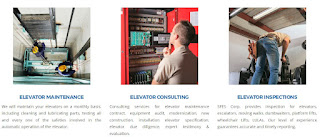Elevator Inspections are a crucial part of maintaining license requirements and ensuring passenger safety in Florida. This guide covers everything Coral Springs building owners and managers need to know about scheduling qualified elevator inspectors.
Overview of Florida Elevator Inspection Laws
The State of Florida requires periodic inspections of all commercial and residential elevators under ASME Safety Code requirements. Key inspection regulations include:
· Annual inspections are mandatory on all elevators to renew their operating certificate.
· Inspections must be performed by qualified elevator inspectors certified by the state.
· The inspector files an inspection report with the DBPR documenting code violations, compliance status, and issuing a certificate of operation if the elevator passes.
· Building owners can face fines if inspections uncover unresolved safety issues or licensing violations.
Regular professional inspections ensure elevators meet essential safety codes and operating standards.
What’s Inspected During an Elevator Inspection?
A comprehensive annual inspection examines components including:
· Cables, pulleys, motors, and hoisting machine
· Doors and door safety devices
· Leveling accuracy and general ride quality
· Interior safety features - lighting, signage, emergency call box
· Electrical wiring and components
· Slings, rollers, buffers, alignment of rails
· General condition of cab interior - floors, panels etc.
· Pit area below cab and proper lubrication
· Compliance with any previous citations
Inspectors test all functions and use diagnostic tools to identify potential problems. They check that updated repair logs are on file.
Why Professional Inspections Are Essential
While building staff can do informal monthly elevator checks, only qualified third-party inspectors can legally perform annual Florida-mandated inspections. Professional inspectors:
· Hold an active certification license confirming expertise.
· Have extensive training on relevant safety codes for your elevator type.
· Use specialized tools and testing procedures.
· Know specific components to scrutinize on different elevator models.
· Can provide full safety analysis based on riding all cars.
· Provide official state-approved documentation.
Don't risk license issues or safety oversights. Schedule certified inspections annually.
How to Choose a Qualified Elevator Inspector
When selecting an inspection company, look for:
· Active licensure in Florida for your elevator category.
· Extensive knowledge of ASME safety codes and Florida statutes.
· Experience with your elevator make and model.
· Use of tools like loadscales to thoroughly test functionality.
· Attention to detail – they should check even obscure components.
· Clear, detailed reports with supporting documentation.
· Quick turnaround of reports to resolve any citations immediately.
· Strong reputation with positive feedback from local customers.
Take time to vet inspectors thoroughly to ensure compliance and safety.
Questions to Ask Prospective Elevator Inspectors
Important questions to ask potential inspectors:
· Are you licensed in Florida for hydraulic/traction elevators?
· How long have you been performing inspections?
· Do you have experience with my elevator’s make and model?
· What inspection methods and tools do you use?
· How long does a typical inspection take?
· When will I receive the full inspection report?
· What documentation do you provide for the state?
· How quickly can you re-inspect if citations are issued?
· Can you provide references from other Coral Springs buildings?
A qualified inspector will readily answer these questions to show their expertise.
Trust Coral Springs Elevator Inspections to the Experts
Staying current with annual Elevator Inspections ensures your Coral Springs building remains code-compliant and maximizes passenger safety. Work with a trusted local inspection company to make the process quick, efficient and fully compliant. Prioritize certified inspections to protect your passengers, reputation and real estate investment.






